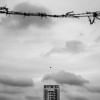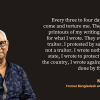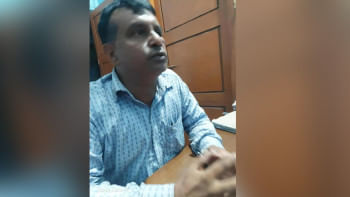Stripping Odhikar of its rights?

When Bangladesh needs to show that it has been listening to the concerns about respecting human rights and upholding the rule of law, it has done quite the opposite. The reactions coming from the United Nations' human rights body, Office of the High Commissioner for Human Rights (OHCHR), and other international rights groups to the deregistration of Odhikar, a leading human rights organisation in Bangladesh, make it clear that no one believes this action to be anything other than a punishment for the work it does. The refusal to renew Odhikar's operating licence follows a letter sent to the OHCHR on May 12, in which the government accused the organisation of "disproportionate bias and prejudice against Bangladesh, in particular the ruling party Awami League" and argued that the UN human rights mechanism should disqualify and shun it as a source of information.
The letter was written as an official response to a joint urgent appeal issued by the Working Group on Enforced or Involuntary Disappearances, Working Group on Arbitrary Detention, the special rapporteur on extrajudicial, summary or arbitrary executions, the special rapporteur on the promotion and protection of the right to freedom of opinion and expression, the special rapporteur on the rights of peaceful assembly and association, the special rapporteur on the situation of human rights defenders, the special rapporteur on torture and other cruel, inhuman and degrading treatment or punishment, and the special rapporteur on the promotion of truth, justice, reparation and guarantees on non-recurrence on February 21, 2022.
The joint appeal raised issues related to the alleged cases of enforced disappearances, the role of Rab, ensuring justice for the victims, and making alleged human rights violators accountable. The joint appeal also urged to stop intimidation and harassment of relatives of the disappeared persons, human rights defenders, and civil society organisations. The appeal specifically raised their concerns about allegations of reprisals against Odhikar. The government response on all those issues raised in the joint appeal was typical repetition of denials of any violations whatsoever, justification of Rab actions, and glorification of internal investigation mechanism of the law enforcement agencies, which has been rejected by most rights groups and experts as hardly credible due to a lack of independence of such procedure.
In relation to the alleged reprisals against Odhikar, the government response argued, "Odhikar is widely known for its disproportionate bias and prejudice against Bangladesh, in particular the ruling Awami League, which is evident in its various reports." It added, "Besides, one of the top members of Odhikar was earlier appointed by the BNP-Jamaat government as the deputy attorney general, which should provide disqualification for the UN human rights mechanism to accept it as an objective and neutral organisation…"
The refusal to renew Odhikar's licence, which has come within less than a month of the government's flimsy argument against the group of having political bias, only proves that the apprehension of the UN experts was justified. Hence, OHCHR spokesperson Ravina Shamdasani says, "Reprisals against Odhikar have been documented since as far back as 2013, and appear to have intensified, with accusations levelled against the organisation for 'anti-state' and 'anti-government' activities." More worryingly, she says, "this decision will have a chilling effect on the ability of civil society organisations to report serious human rights violations to UN human rights mechanisms."
Similar observations have been made by leading global human rights groups, including Amnesty International, Human Rights Watch and the International Coalition Against Enforced Disappearances (ICAED). Eleven organisations in a joint statement said this decision demonstrated "the (Bangladesh) government's determination to stifle human rights work in the country." According to them, "It is the authorities' failure to ensure accountability for human rights violations, rather than Odhikar's exposure of those violations that has tarnished Bangladesh's reputation." Furthermore, these groups have described the process of deregistration as "politically motivated persecution of human rights defenders and critics," and called for allowing human rights groups to do their work without fear and ensure accountability for human rights violations.
Odhikar, founded in 1994, has been documenting violations of human rights by state and non-state actors in Bangladesh since its inception. But it has drawn the ire of the ruling party and the government after its controversial report and alleged death count during the violent crackdown on Hefazat-e-Islam's notorious Dhaka siege programme on May 5, 2013. The apparent anomaly in casualty figures between the official one and Odhikar's count landed its director in prison. The irony is that the government and the ruling party apparently made up with Hefazat long ago, but Odhikar and its executives are still being haunted for the alleged miscounting of victims in their voluntary role of monitoring human rights.
No wonder that Odhikar's application for the renewal of its operating licence remained pending since 2014. Since then, it has also been unable to access any funds from foreign donors as the regulatory authority, the NGO Affairs Bureau, has kept a lid on such resources. Despite such constraints, it managed to keep working and continue monthly and annual reports on all kinds of rights violations, including enforced disappearances, extrajudicial killings and border killings. It sought the Supreme Court's intervention in getting the licence renewed but, ahead of the conclusion of the court's hearing, the government rejected its renewal application. Media reports quoted the NGO Affairs Bureau chief saying that the disposal of the application would end the cause of the legal proceeding.
A strategic move, indeed! But keeping Odhikar's application pending for eight years and refusing the renewal on the grounds that it failed to fulfil requirements of a law enacted two years after the submission of the petition shows that the way has been made to operate against the organisation. And, it comes amid global concern of persecuting it for reporting "serious human rights violations to UN human rights mechanisms," and is bound to be perceived as a reprisal. Appearing vindictive against human rights defenders is not what Bangladesh needs following the imposition of sanctions against an entire unit of its law enforcement agencies by the world's most powerful nation.
Kamal Ahmed is an independent journalist and writes from London, UK. His Twitter handle is @ahmedka1

 For all latest news, follow The Daily Star's Google News channel.
For all latest news, follow The Daily Star's Google News channel. 








Comments